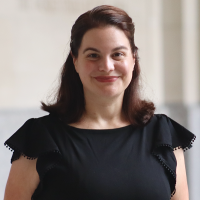Cutting through the Noise: Engaging the Public in Arctic Science
To have an informed public eager to engage in discourse around Arctic science, it is vital to not only make scientific findings widely available, but relevant. The Woodrow Wilson International Center for Scholars’ Science and Technology Innovation Program, Serious Games Initiative, and Polar Initiative are proud to partner to host a panel on the public communication of environmental sciences in Alaska.
Researchers, educators, and environmental policy experts have a two-part problem when it comes to talking about environmental policy: providing access to the data and materials and public engagement with science. To the first, making science accessible, this panel will re-examine the way we conduct research and present scientific data with case examples from Alaska-based research conducted by leading researchers. To the second, this panel will present projects that illustrate the viability of using tools from compelling visualizations of data to citizen science to direct learning experiences, such as games. Combined, these innovative practices demonstrate how we can cut through the noise of standard practices and make science alive and engaging for a broader public.
Key projects outlined on this panel will include initiatives that aimed to do just that: make science transparent, accessible, and engaging:
The Polar Learning and Responding (PoLAR) Climate Change Education Partnership, an NSF funded program designed to make environmental concerns around Arctic ice come alive. PoLAR has been responsible for developing games like EcoChains, a card game designed that illustrates adaption, migration and the impact of climate shifts on Arctic ecosystems. By allowing people to experience these ecosystems through play, PoLAR has found this opens the way to a unique way to engage and learn about Arctic science.
Alaska's Landscape Conservation Cooperatives joined the Aleutian Pribilof Islands Association, Alaska Sea Grant, the Alaska Ocean Observing System as well as several agencies, tribal organizations and tribes to host workshops about coastal climate change. This program exemplified ground-up approaches to climate science, where tribal and communities were the focus of dialogue around coastal resilience. These workshops engaged 300+ people from 52 tribes and 18 federal and state agencies in regional conversations about changes underway and how Alaskans can work together to address them. This effort resulted in an emerging statewide coalition interested in sharing ideas and resources to find ways to adapt to Alaska's changing climate, ADAPT Alaska.
Event Summary
On April 4, 2018 the Wilson Center’s Science & Technology Innovation Program and Polar Initiative hosted an event entitled “Cutting through the Noise: Engaging the Public in Arctic Science. The program was introduced by Jack Durkee, Program Assistant, Polar Initiative, and moderated by Dr. Elizabeth Newbury, Director, Serious Games Initiative. Panelists included Dr. Stephanie Pfirman, Professor of Environmental & Applied Sciences and Co-Chair, Environmental Science Department, Barnard College; Dr. Jeremy Mathis, Associate Professor (Adjunct) of Environmental Policy, Georgetown University and NOAA Policy Fellow, Office of Senator Lisa Murkowski (R-AK); Aaron Poe, Coordinator, Aleutian and Bering Sea Islands Landscape Conservation Cooperative; and Karen Pletnikoff, Community Environment and Safety Manager, Aleutian Pribilof Islands Association Inc. Sherri Goodman, Senior Fellow, Wilson Center, provided concluding remarks.
After Durkee and Newbury welcomed the audience and panelists, Pfirman shared her work with the Polar Learning and Responding (PoLAR) Climate Change Education Partnership, which uses serious games to highlight climate change in the Arctic region. This work has been useful in illuminating the costs of climate change to various Arctic stakeholders. Pfirman discussed in particular one role-playing game that involves players creating a marine-management plan to respond to an environment crisis. Participants typically retained the knowledge at higher rates than those who simply read an article. By bringing their own personal experiences to the games, participants are able to identify more clearly with the challenges presented and have an increased sense of agency in terms of what they can do to help fight climate change and protect Arctic communities.
Mathis discussed how some Arctic projects do not effectively engage with the communities they are trying to assist. Rather than asking communities of their needs and perspectives, many projects approach the communities, in good faith, after they have started, preventing true engagement from occurring and encroaching on the values of the community. Instead, it is important for policy-makers to actively engage the community and collaboratively work towards collective solutions. Mathis also noted that the United States is lacking national attention on the needs of Alaska and Arctic science. Issues like ocean acidification will increasingly affect individuals; Mathis argued that the risk of not acting as a country, as North America, and/or as a global community is too great to ignore.
Poe and Pletnikoff discussed the partnership between their organizations and others in efforts to hold workshops regarding coastal resilience and adaptation. These workshops are good opportunities for organizers, scientists, and policy-makers to hear from communities about their needs. A unique communication aspect of these workshops has been the use of posters, which have allowed for products to be more encompassing of communities’ long-term needs and goals. These posters are also designed to communicate to a variety of stakeholders, from scientists to community members. Poe and Pletnikoff also discussed the work of ADAPT Alaska, a digital platform working to bring people together to share best practices for connecting traditional ecological and indigenous knowledge with science and technology to inform adaptation strategies. Pletnikoff also noted the importance of the ability to share critical data in real-time on this platform, particularly in emergencies.
Summary written by Marie-Charlotte Pierre (Polar Initiative Intern)
Introduction

US Ambassador-at-Large for Arctic Affairs; Former Chair, US Arctic Research Commission
Moderator

Panelists



Hosted By

Science and Technology Innovation Program
The Science and Technology Innovation Program (STIP) serves as the bridge between technologists, policymakers, industry, and global stakeholders. Read more


Polar Institute
Since its inception in 2017, the Polar Institute has become a premier forum for discussion and policy analysis of Arctic and Antarctic issues, and is known in Washington, DC and elsewhere as the Arctic Public Square. The Institute holistically studies the central policy issues facing these regions—with an emphasis on Arctic governance, climate change, economic development, scientific research, security, and Indigenous communities—and communicates trusted analysis to policymakers and other stakeholders. Read more


Serious Games Initiative
The Serious Games Initiative communicates science and policy complexities through the world’s most dynamic medium: gaming. Read more
